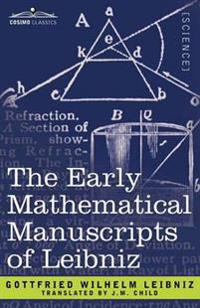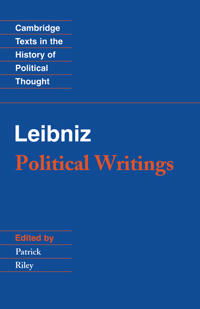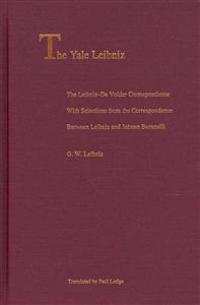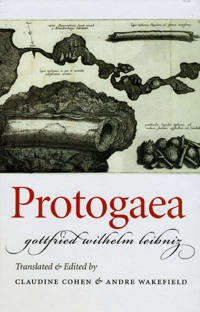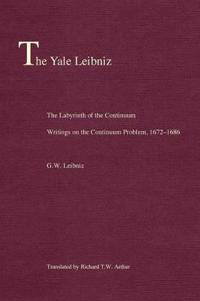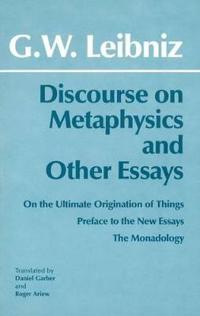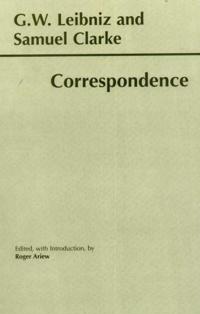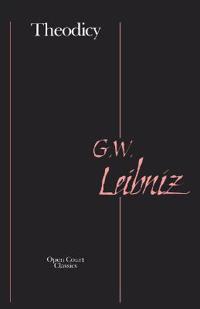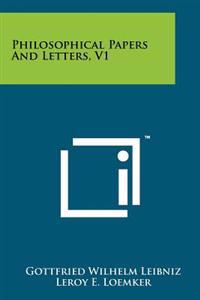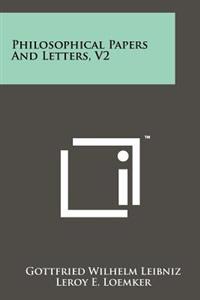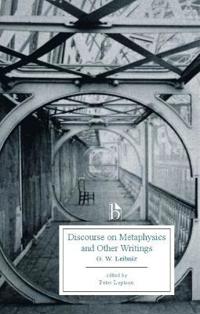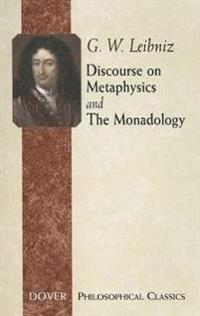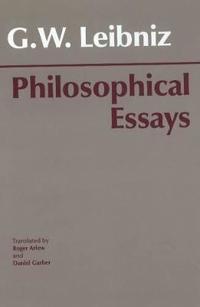The Early Mathematical Manuscripts of Leibniz (Pocket)
avGottfried Wilhelm Leibniz, J. M. (TRN) Child, Gottfried Wilhelm Leibniz
ISBN: 9781605205335 - UTGIVEN: 2008-12Leibniz: Political Writings (Häftad)
avFreiherr von Gottfried Wilhelm Leibniz
ISBN: 9780521358996 - UTGIVEN: 1988-11Leibniz?s political and ethical writing long has been neglected, and with this new edition Professor Riley makes available the most representative pieces from Leibniz?s political theory. This new edition, specially prepared for this series, is the first to make a considerable number of Leibniz?s wri[...]
The Leibniz-De Volder Correspondence (Inbunden)
avGottfried Wilhelm, Freiherr von Leibniz, Paul Lodge, Gottfried Wilhelm, Freiherr von Leibniz
ISBN: 9780300108231 - UTGIVEN: 201302This volume is a critical edition of the eight-year correspondence (1698-1706) between Gottfried Wilhelm Leibniz and Burcher de Volder, professor of philosophy and mathematics at Leiden University. Containing the surviving correspondence between Leibniz and De Volder, the volume also presents a gene[...]
G.W. Leibniz's Monadology (Pocket)
avGottfried Wilhelm, Freiherr von Leibniz, Nicholas Rescher, Gottfried Wilhelm, Freiherr von Leibniz
ISBN: 9780822954491 - UTGIVEN: 199109G.W. Leibniz's "Monadology," one of the most important pieces of the Leibniz corpus, is at once one of the great classics of modern philosophy and one of its most puzzling productions. Because the essay is written in so condensed and compact a fashion, for almost three centuries it has baffled and b[...]
Protogaea (Pocket)
avGottfried Wilhelm Leibniz, Claudine (TRN) Cohen, Andre (TRN) Wakefield
ISBN: 9780226113012 - UTGIVEN: 2010-11Claudine Cohen and Andre Wakefield offer the first English translation of "Protogaea", a central text in natural philosophy and an ambitious account of terrestrial history. Written between 1691 and 1693, and first published long after Leibniz's death in 1749, "Protogaea" reemerges in this bilingual [...]
The Labyrinth of the Continuum (Häftad)
avFreiherr von Gottfried Wilhelm Leibniz
ISBN: 9780300205053 - UTGIVEN: 2013-08This book gathers together for the first time an important body of texts written between 1672 and 1686 by the great German philosopher and polymath Gottfried Leibniz. These writings, most of them previously untranslated, represent Leibniz's sustained attempt on a problem whose solution was crucial t[...]
New Essays on Human Understanding (Pocket)
avGottfried Wilhelm Leibniz, Peter (TRN) Remnant, Jonathan Francis (TRN) Bennett
ISBN: 9780521576604 - UTGIVEN: 1997-01In the New Essays on Human Understanding, Leibniz argues chapter by chapter with John Locke?s Essay Concerning Human Understanding, challenging his views about knowledge, personal identity, God, morality, mind and matter, nature versus nurture, logic and language, and a host of other topics. The wor[...]
Discourse on Metaphysics and Other Essays (Häftad)
avFreiherr von Gottfried Wilhelm Leibniz
ISBN: 9780872201323 - UTGIVEN: 199202Discourse on Metaphysics and Other Essays contains complete translations of the two essays that constitute the best introduction to Leibniz's complete thought: 'Discourse on Metaphysics', a short course in his metaphysics, written in 1686 at the time his mature thought was just crystalising and 'Mon[...]
Correspondence (Pocket)
avGottfried Wilhelm Leibniz, Samuel Clarke, Roger (EDT) Ariew
ISBN: 9780872205246 - UTGIVEN: 2000-03For this new edition, Roger Ariew has adapted Samuel Clarke's edition of 1717, modernising it to reflect contemporary English usage. Ariew's introduction places the correspondence in historical context and discusses the vibrant philosophical climate of the times. Appendices provide those selections [...]
Theodicy (Häftad)
avFreiherr von Gottfried Wilhelm Leibniz
ISBN: 9780875484372 - UTGIVEN: 198812In order to be truly free, must you act arbitrarily? If an event did not happen, could it have happened? Since there is evil, and God could have made the world without evil, did God fail to pick the best course? Grappling with such simple--yet still intriguing--puzzles, Leibniz was able to present a[...]
Philosophical Papers and Letters, V1 (Häftad)
avGottfried Wilhelm Leibniz, LeRoy E. Loemker
ISBN: 9781258193119 - UTGIVEN: 2011-10Philosophical Papers and Letters, V2 (Häftad)
avGottfried Wilhelm Leibniz, LeRoy E. Loemker
ISBN: 9781258198183 - UTGIVEN: 2011-10Gottfried Wilhelm Leibniz (Inbunden)
ISBN: 9781439892220 - UTGIVEN: 2011-10Gottfried Wilhelm Leibniz: The Polymath Who Brought Us Calculus focuses on the life and accomplishments of one of the seventeenth century's most influential mathematicians and philosophers. The book, which draws on Leibniz's written works and translations, and reconstructs dialogues Leibniz may have[...]
Discourse on Metaphysics and Other Writings (Pocket)
avGottfried Wilhelm Leibniz, Peter (EDT) Loptson, Robert (TRN) Latta
ISBN: 9781554810116 - UTGIVEN: 2012-08Filosofisia tutkielmia (Inbunden)
avGottfried Wilhelm Leibniz
ISBN: 9789524951210 - UTGIVEN: 2011Gottfried Wilhem Leibniz (1646-1716) oli filosofian rationalistisen perinteen huipentaja ja äärimmäisen tuottelias universaalioppinut. Hänen omat tieteelliset aloitteensa, keskeneräisetkin, olivat usein paljon aikaansa edellä. Filosofisia tutkielmia sisältää Leibnizin tärkeimmät metafyysi[...]
Discourse On Metaphysics And The Monadology (Pocket)
avGottfried Wilhelm, Freiherr von Leibniz, George R. Montgomery, Gottfried Wilhelm, Freiherr von Leibniz
ISBN: 9780486443102 - UTGIVEN: 200507Two of Leibniz's most studied and often quoted works appear in this volume. Published in 1686, the "Discourse on Metaphysics consists of the philosopher's explanation of individual perception as an expression of the rest of the universe from a unique perspective. The whole world--the best of all pos[...]
Philosophical Essays (Pocket)
avGottfried Wilhelm, Freiherr von Leibniz
ISBN: 9780872200623 - UTGIVEN: 198903Translated by Roger Ariew ansd Daniel Garber.

